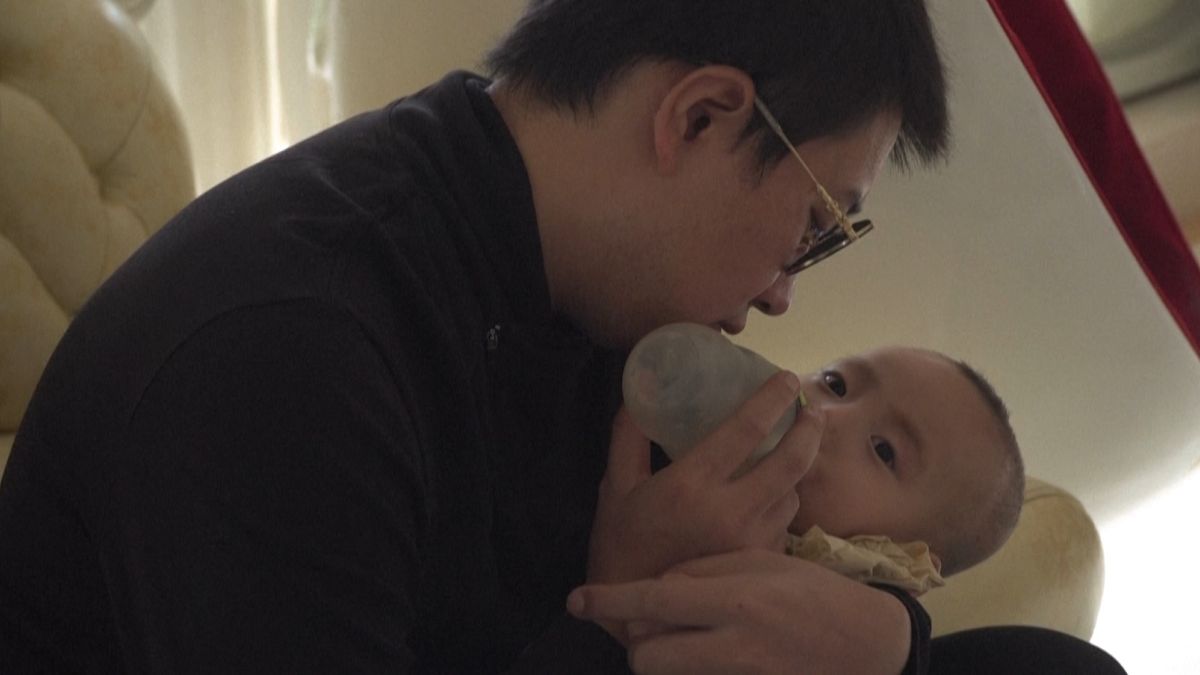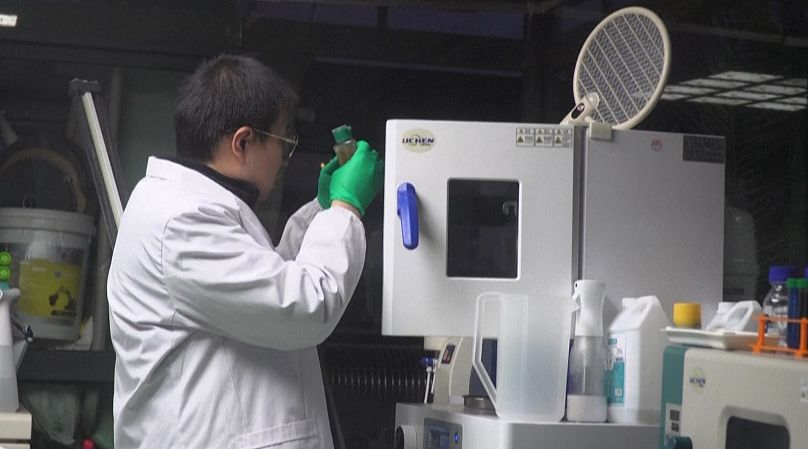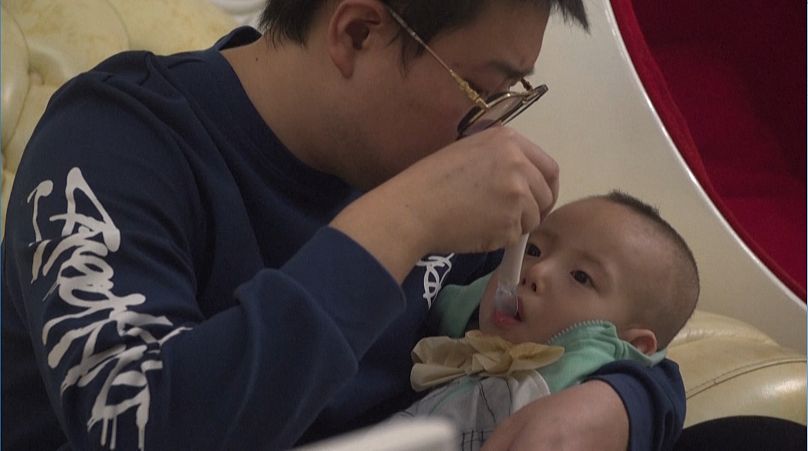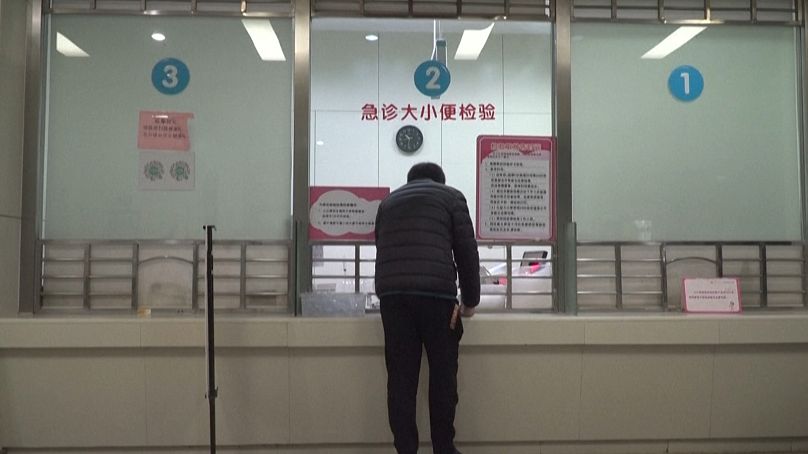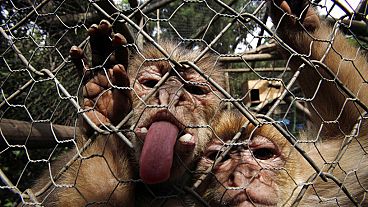The medicine that could help this man’s son is not available in China, while COVID prevented any possibility of travelling abroad for treatment.
How far would you go to save your child’s life?
Haoyang was born in Kunming in southwestern China two years ago with a very rare disease: Menkes Syndrome.
The disease is a genetic disorder that impacts how copper - which is crucial for brain and nervous system development - is processed in the body.
Menkes Syndrome is more prevalent in boys than girls, and it is estimated 1 in 100,000 babies are born with the disease globally according to the organisation Rare Diseases. Sufferers rarely survive beyond the age of 3.
Symptoms usually appear within the first few months of life and include sparse, kinky hair, as well as slow growth (or failure to thrive) and seizures.
Additional features may include low muscle tone, known as hypotonia, sagging facial features, and developmental and intellectual disability.
Treatment can help cope with the disorder, but it is not available in China. And because of tough COVID-19 restrictions, chances of Haoyang travelling abroad to get the appropriate medication are close to none.
To overcome the situation, Xu Wei, Haoyang’s father, decided to build a home laboratory and create his own medicine.
"When I knew that there's treatment available for my child's disease and theoretically it could be tried, although it's far away from us ordinary people, I still believe that I can try to let my son at least pursue this hope," Xu Wei told AFP.
"I don't want him to wait for death in despair. Even if it fails, I wish my son is on a path of pursuing hope".
From small online businessman to amateur chemist
With only a high school level of education, Xu Wei created his DIY lab in his father’s gym.
Most online documents on Menkes Syndrome were in English, but undeterred Xu used translation software to understand them.
On discovering copper histidine could help, he set up the equipment to create it himself, mixing copper chloride dihydrate with histidine, sodium hydroxide, and water.
"At that time, I just learned what was needed," he explained.
"For instance, when learning the preparation process, if I want to know what copper chloride dihydrate and a clean bench is, I will specifically look up the terms. I only needed to understand the preparation process in the papers and then I could make the copper histidine that I wanted. That was the most urgent thing for me at that time".
Some of his friends tried to talk him out of his efforts, but Xu Wei’s only goal is to save his son.
"I did think of giving up when I encountered difficulties in the beginning,” he admitted.
“No one can insist on continuing with something 365 days, every minute and every second. It is impossible. So I will allow myself to give up, but just for one night, one day or two days, to release some pressure, and then I will come back to the road of seeking this treatment".
He first tested the mixture on rabbits, then injected the treatment into his own body. Noting there were no side effects after a few trials, the father started to treat Huayang with the home-produced remedy.
Xu has given Haoyang a daily dose of the medicine, which gives the child some of the copper his body is missing.
The amateur chemist claims that a few of the blood tests returned to normal two weeks after beginning the treatment.
Homemade medicine, a limited impact
"It’s not difficult to produce this medicine," Huang Yu, Deputy Director of the Medical Genetics Department at Peking University, told AFP.
For Huang, this medicine is a "simple organic reaction".
"From what I see, at least nothing looks wrong for safety in the production of the compounds used in his early treatment," he added.
"For example, the copper sulfate he used can be found in our daily foods and it’s not dangerous. The later work he did was more about cell culture experiments, which would not pollute the environment too much. Of course, this does need to be supervised by the regulatory authorities, so I hope that his laboratory can be gradually formalised".
According to China’s relevant policy, if someone wants to apply for the production of medicine, he or she has to go through a series of animal experiments, human experiments, Huang listed. "It has a set of requirements".
But the medicine is not a cure.
Professor Annick Toutain, a specialist of rare diseases at the Tours University Hospital in France, said the copper treatment "is only efficient against certain genetic anomalies and if it is administered very early on, in the first three weeks of life".
She said that after that the treatment will alleviate symptoms, "without leading to recovery".
Xu accepts that it can "only slow down the disease".
He has also been approached by other parents of children suffering from the same disorder, but he refused to give (or sell) them the medicine.
"I can only be responsible for my child," he told AFP. Health authorities have said they will not intervene as long as he only makes the treatment for home use.
Huang told AFP that as a doctor he was "ashamed" to hear of Xu's case.
He said he hoped that "as a developing country, we can improve our medical system to better help such families".
His work has led to interest from VectorBuilder, an international biotech lab, which is now launching gene therapy research with Xu into Menkes syndrome.
The company's chief scientist Bruce Lahn described it as "a rare disease among rare diseases" and said they were inspired after learning about Xu's family.
Clinical trials and tests on animals are planned for the next few months.
